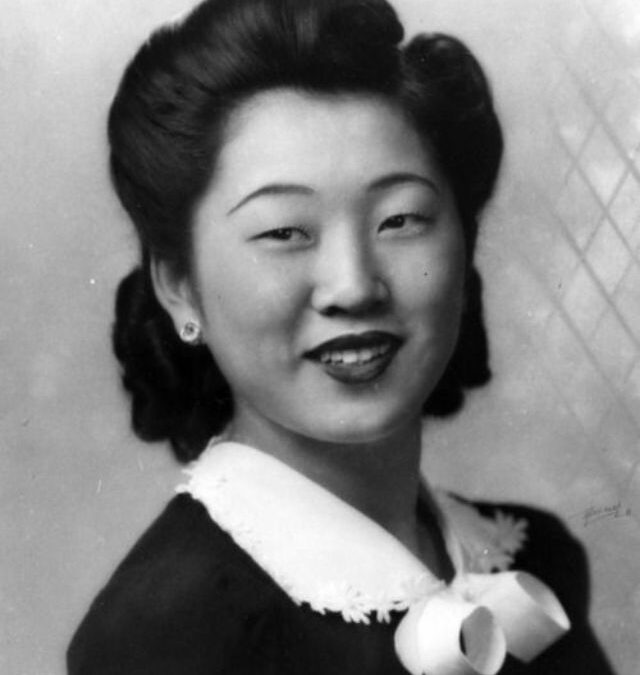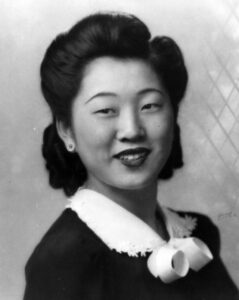- Subscribe to my newsletter! Click here →
Kiyoko

 In the first version of The Secret Keeper, Dash had a good friend named Kiyoko Sasaki, a Japanese Canadian whose family was experiencing the nightmare of the internment camps.
In the first version of The Secret Keeper, Dash had a good friend named Kiyoko Sasaki, a Japanese Canadian whose family was experiencing the nightmare of the internment camps.
“Hey, Dash!” Kiyoko Sasaki, one of her best friends, appeared before her in a sweet blue dress speckled with white flowers, and Gus took a step back. “I’m so glad you’re here!”
“I’ll find you later,” Gus promised, heading off into the crowd as Kiyoko joined Dash.
Kiyoko’s father had fought in the last war, and until recently he had been a successful businessman of some kind, which was obvious from the girl’s always-beautiful wardrobe. Kiyoko had been born in 1923 in the Toronto Western Hospital, just down the hall from the twins, though no one knew that at the time, of course. Six years ago, Kiyoko had transferred into the girls’ school, and Dash had been consumed with curiosity. Kiyoko was the only Japanese person she had ever known, and it turned out Dash and Dot were the only twins Kiyoko had ever known. At first Dash had stood back and observed the quiet Kiyoko speaking and moving, captivated by the differences between them. But then Dot had come along and started speaking practically to Kiyoko about something they’d discussed in class, inadvertently showing Dash that really, there were no differences between them at all. From there the three girls had developed a friendship that was so much more than a novelty.
“Where’s Dot?” Kiyoko asked, handing Dash a glass of lemonade.
Past Kiyoko’s shoulder she could see Dot, nodding patiently at something Eileen was saying. Poor thing. Eileen was such a busybody. Dash would go rescue her sister in a few minutes. “She got caught up talking with Eileen.”
“Oh boy. That girl can talk your ear off. We may not see your sister until the end of the night.”
Dash took a sip of the lemonade. “I’m sorry I haven’t asked lately, but how’s your father?”
She drew in closer, as if she were sharing a secret. “We don’t hear from him very often, but when we do, my heart just breaks. He’s working so hard in that labour camp, building roads. I worry about him all the time.”
“You did. That’s horrible. But he was born here.”
“That doesn’t matter. Right after the attack on Pearl Harbour, they declared all Nisei—”
“What’s that?”
“Nisei is Japanese for Japanese Canadians. Those who were born here. All Nisei are considered enemy aliens now.”
Dash frowned, unsure. Kiyoko was as Canadian as she was. “Not you, though.”
“Yes! Me too! Apparently I’m the enemy, if you can believe that! For now this is only affecting the ones in British Columbia, but who knows when it might happen here.”
“No.”
“It could happen, Dash. The war is turning things upside down. Now there are tens of thousands of Nisei in those camps, including all the women and children on the west coast. My mother’s sister lives in a livestock barn at the Exhibition grounds in Vancouver.”
“A livestock barn! Kiyoko! How awful!”
“Her husband had his fishing boat taken away, and the government sold it.”
“What a crime. Why?”
“It’s so ridiculous. It would be funny if it weren’t so terrible. The government suspects Japanese Canadians will side with the Japanese during this war and possibly attack from within. But that makes no sense. My family was all born here. We’re all British citizens. We would never do anything like that.” She closed her eyes briefly. “Oh, Dash. Father was so smart to send my mother and my sisters and me out here.”
“Is he all right?”
“His letters sound so sad, though I know he’s trying to shield us from the worst of it.”
“When can he come home?”
“After the war ends, I suppose. I hope so, anyway. Imagine if they sent them all back to Japan! I might never see him again!”
“Gosh, Kiyoko. I wish there was something we could do to help.”
“No one can help, I’m afraid. We just have to wait.” She tilted her head, smiling sadly. “But let’s not talk about this. I want to have fun tonight. Listen to that music!”

